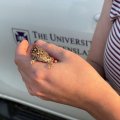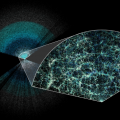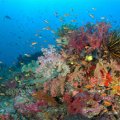The University of Queensland’s Engineering research was one of many stand-out performers at UQ in the specialised categories of the Excellence in Research for Australia survey, released yesterday.
ERA evaluated 101 specialised categories of UQ research and reported that 96 per cent of them are at world standard or above.
Engineering research at UQ received only the most prestigious ratings, scoring well above or above world standard in all nine fields in which it was assessed.
These were (at the highest level, well above world standard) Environmental, Materials, and Mechanical Engineering, and Resources Engineering & Extractive Metallurgy, and (at level 4, above world standard): Food Sciences, Biomedical, Chemical, Civil, and Electrical & Electronic Engineering.
The ERA report, a comprehensive national assessment of research in all Australian universities, ranked 101 specific fields of research at UQ.
Twenty eight of UQ’s research areas were in the top band (well above world standard), and another 42 were at level 4 (above world standard).
Across Australia, ERA assessed a total 157 fields of research, and these were combined with other data to evaluate the broad category fields, in which UQ also had exceptional results.
UQ scored well above or above world standard rankings in all categories in Physical Sciences (four), Education (four), Language Communication & Culture (four), and Technology (three).
UQ Medical & Health Sciences put in a particularly strong showing in ERA’s specialised assessment , with UQ research in Cardiovascular Medicine & Haematology and Neurosciences rated well above world standard.
Ten further specialised areas of UQ Medical & Health Science research were ranked above world standard: Dentistry, Nursing, Immunology, Medical Microbiology, Oncology & Carcinogenesis, Paediatrics & Reproductive Medicine, Pharmacology & Pharmaceutical Sciences, Human Movement & Sports Science, Public Health & Health Services, and Clinical Sciences.
In Biological Science, five categories of UQ’s research were at the highest level (well above world standard): Ecology, Evolutionary Biology, Genetics, Plant Biology and Zoology.
Other specialised research areas at UQ that ERA ranked in the highest band (well above world standard) included Nanotechnology, Environmental and Industrial Biotechnology, Ecological Applications, Quantum Physics, Astronomical & Space Sciences, Statistics, Numerical & Computational Mathematics, Medicinal & Biomolecular Chemistry, Theoretical & Computational Chemistry, Macromolecular & Materials Chemistry, Sociology, Cultural Studies, Economic Theory, Business & Management, Banking, Finance & Investment, and Specialist Studies in Education.
Among UQ’s specialised areas ranked at level 4 (above world standard) were Oceanography, Information Systems, Architecture, Urban & Regional Planning, Curriculum & Pedagogy, Accounting/Auditing & Accountability, Marketing, Anthropology, Archaeology, Political Science, Social Work, Psychology, Cognitive Sciences, Law, Art Theory & Criticism, Performing Arts & Creative Writing, Communication & Media Studies, Linguistics, Literary Studies, and Historical Studies.
In ERA's broader categories, UQ is above world standard in 21 fields of research, more than any other Australian university.
Media: For interviews with Vice-Chancellor Professor Paul Greenfield, call Fiona Kennedy ph +61 7 3365 1384
Professor Alan Lawson, UQ Pro-Vice-Chancellor (Research and International), +61 7 3346 6293 a.lawson@research.uq.edu.au
Fiona Cameron, UQ Communications, ph +61 7 3346 7086, f.cameron2@uq.edu.au










